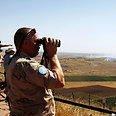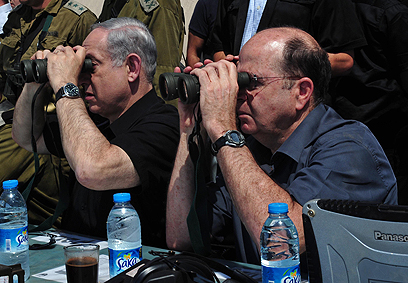
Israel-Syria border
צילום: רויטרס
Israeli military focuses on northern border
As threats come from multiple directions – Lebanon, Syria, Egypt – Jewish state prepares for next war, a new kind of warfare
An Israeli soldier collapses onto the floor of a house in Lebanon, shot by Hezbollah fighters. As his squad mates clear out the second floor, a medic rushes over, pulling on latex gloves and digging into his first aid kit. Gunfire echoes down the stairs as he starts to work on the wound.
The Israeli military experienced this kind of brutal house-to-house warfare during its inconclusive 2006 war with Hezbollah. As it trains in a mock village in its base in this northern Israeli town, it is recreating similar battle scenarios as it prepares for the next confrontation with the Lebanese terror group. Officials say such a conflict could erupt at any time.
Related stories:
- Israel strengthens Syria border with an eye on Hezbollah
- Op-ed: Israel, Syria and rebels wait with guns drawn
- Hezbollah watching IDF movements
While the world has focused its attention on the turmoil in Egypt following the ouster of President Mohamed Morsi, Israel is keeping a close eye on its northern flank, where officials say the Syrian civil war, and Hezbollah's increasing involvement there, have created a combustible mix that could draw in Israel with little notice.
"They are more and more deeply embedded in their infighting and we have to be prepared, we have to watch the border and have the forces that will enable us to respond quickly and decisively," said Lt. Col. Peter Lerner, a military spokesman.
Israel has been warily watching the Syrian conflict since it erupted in March 2011, fearing that sophisticated weapons could be transferred to Hezbollah during the chaos. Though they have not taken sides, Israeli leaders have said they would take military action to prevent "game-changing" arms from reaching the militant group.
Israeli warplanes have carried out at least three airstrikes in recent months on what were believed to be advanced missiles on their way to Hezbollah. A pair of mysterious explosions over the past week, one at an arms depot in Syria and a second in a Hezbollah stronghold in Lebanon, has raised suspicions that Israel was involved.

Netnayhau, Ya'aalon at border (Photo: Ariel Hermoni)
Israel has not confirmed involvement in any of the airstrikes or explosions, but even the perception of an Israeli connection raises the risk of a reprisal.
On several occasions this year, mortar shells and tank rounds from Syria have landed inside Israeli-controlled territory, causing damage and spreading panic but causing no injuries. Israel says most of the attacks have been errant fire, but it has sometimes accused Syria of aiming at Israeli targets, and has briefly fired back across the border.
In the wake of an Israeli airstrike in May, Syrian President Bashar Assad threatened to retaliate, while Israel's air force chief has warned that a "surprise war" could break out at any time.
Conflict with Syria would almost certainly mean renewed hostilities with Hezbollah, Syrian President Bashar Assad's close ally, which battled Israel in a month-long war in 2006 that ended in stalemate. During the fighting, Hezbollah fired some 4,000 rockets and missiles into Israel. Defense officials believe Hezbollah has restocked its arsenal with tens of thousands of missiles, some capable of striking deep inside the Jewish state.
The base in Elyakim, in northern Israel, plays a key role in preparing for any future confrontation. The military built the complex after the 2006 war to institutionalize the lessons of guerrilla warfare. The village complex features networks of tunnels, and trainers frequently take hostages as part of battlefield scenarios like the one involving the wounded soldier and the frantic fight for control of the house.
Lt. Archie Leonard, a spokesman for the school, said the experience of the last war gives the soldiers an important step up compared to 2006. He said intelligence keeps the trainers up to date on Hezbollah tactics.
"The next time that we'll go in, if we go in, we'll be much more forceful and more effective," he said. "I think the Hezbollah is getting better, but we're ahead of them and we'll always be a step of ahead of their abilities."
Such training is only one step in a series of measures Israel has taken to boost security along its borders with Lebanon and Syria. The military has beefed up its physical defenses in the Golan Heights over the past two years, and officials say it has improved its intelligence operation to give early warning of potential attacks.
Reflecting the high priority of the northern front, the military announced plans this week to create a new army division to oversee the Golan Heights, along the Syrian front, and "address emerging threats" like the one from Hezbollah.
It approved the step even as defense officials slash their budget. The military is turning its forces away from heavy arms like tanks toward non-traditional forms of warfare like the guerrilla battle it faced in Lebanon. Defense Minister Moshe Ayalon said on Thursday that "army-to-army battles of the type we last saw 40 years ago in the Yom Kippur War are becoming less and less relevant," referring to the 1973 conflict in which Israeli forces confronted mass formations of Egyptian and Syrian tanks.
For now, Israeli officials believe neither Syria nor Hezbollah is interested in war. Assad is preoccupied with rebels trying to oust him, and the Israeli military estimates that around 3,000 Hezbollah fighters have entered Syria to aid him. Officials believe the group has lost some 200 fighters.
Such losses have may have weakened Hezbollah in the short term. But officials say Hezbollah's experience in the civil war may prove a valuable training ground. Officials point to the heavy Hezbollah involvement in the Syrian government's attack on the city of Qusair several weeks ago, and said that Israel has seen Hezbollah fighters operating tanks.
In May, Hezbollah leader Hassan Nasrallah said that the group would help Syria retake the Golan Heights or accept upgraded arms from its military. "The resistance is prepared to accept any sophisticated weaponry even if it was to break the balance (of force)," he said.
Yoram Schweitzer, a terrorism expert at the Institute for National Security Studies, a Tel Aviv think tank, said that even a weakened Hezbollah still can hurt Israel.
"In spite of its dire straits situation in Syria, mainly, the way it was equipped with very sophisticated armament and training by states is still posing a threat to Israel," Schweitzer said. No matter how many fighters Hezbollah loses, he argued, it maintains the ability "to send many rockets to Israel to devastate the country."
- Receive Ynetnews updates directly to your desktop










